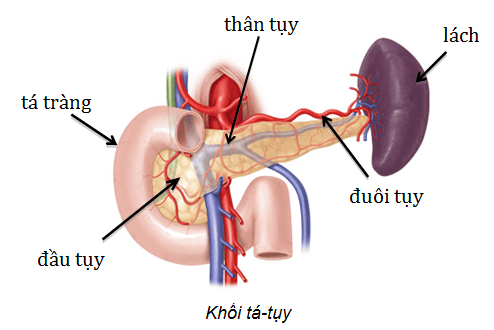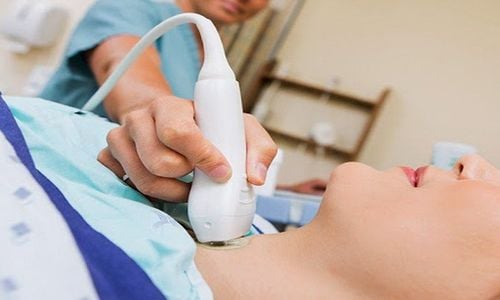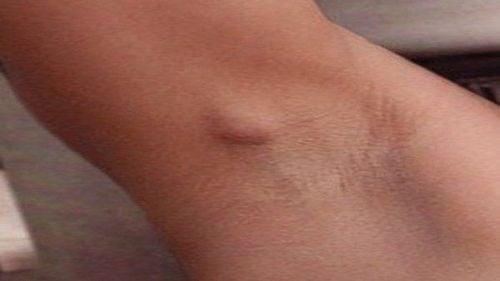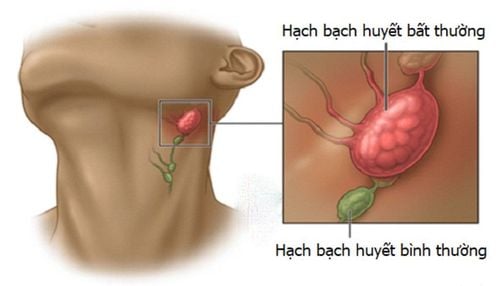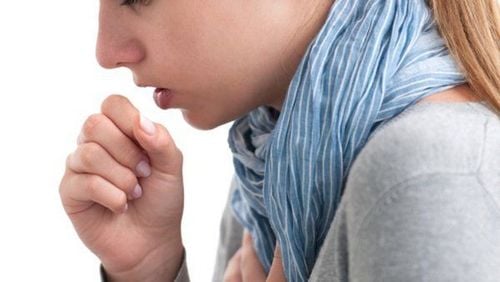This is an automatically translated article.
Swollen lymph nodes are quite common and can occur at any age. Although swollen lymph nodes are quite common, this does not mean that the disease will not cause any serious problems. In some cases, painful swollen lymph nodes are a warning sign of some malignancy.1. What is a lymph node?
Lymph nodes have a round bean-shaped structure, which can float in different parts of the body: Neck, armpits, groin, chest and abdomen. They act as a filter for lymph fluid containing particles and infectious agents such as viruses and bacteria from outside entering the body. Lymph nodes are also where immune cells appear in large numbers to fight pathogens.
Swollen lymph nodes is a condition in which the lymph nodes in the body become swollen. Glands, also known as lymph glands, are responsible for filtering the lymphatic fluid circulating in the body through the lymphatic vessels. So it can be said that the lymph glands act in a similar way to the flow of blood through a blood vessel.
Trắc nghiệm: Thử hiểu biết của bạn về hạch bạch huyết
Hạch bạch huyết có vai trò quan trọng trong hệ miễn dịch của cơ thể. Bài trắc nghiệm dưới đây giúp bạn hiểu phần nào vai trò và chức năng của hạch bạch huyết.
Bài dịch từ: webmd.com
2. Causes of swollen lymph nodes
2.1 Swollen lymph nodes can be caused by infections When swollen, inflamed, or enlarged, lymph nodes can be hard, firm, or tender. Common causes include: colds and flu, tooth abscesses, impacted teeth, gum disease, mouth sores, ear infections, skin infections, sexually transmitted diseases, tonsillitis, and more.
2.2 HIV infection
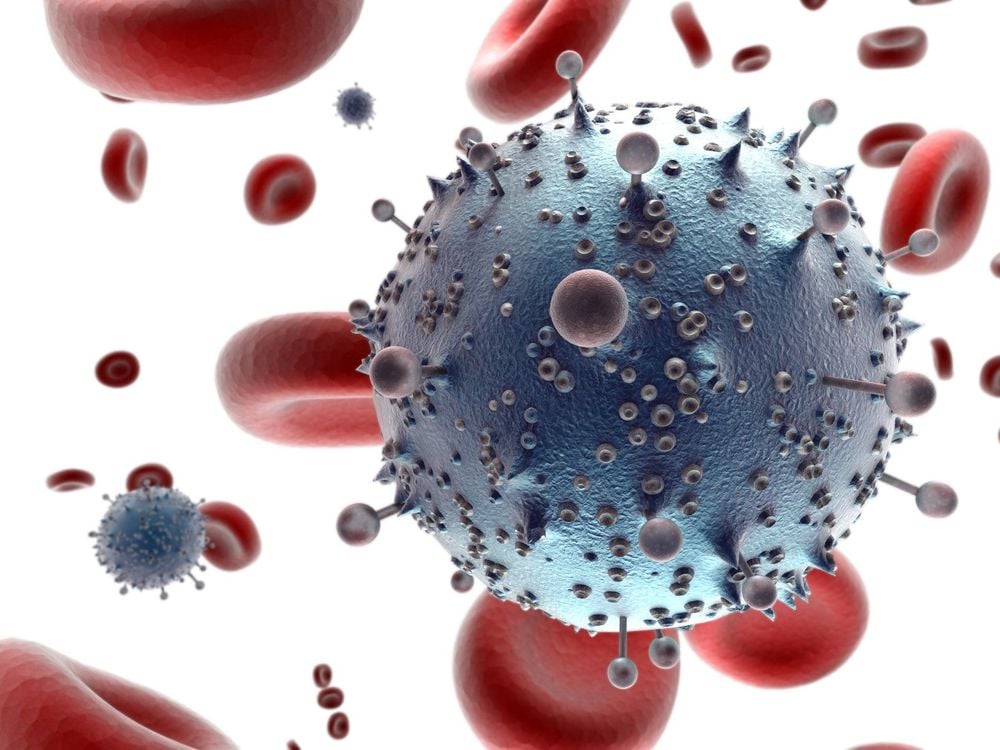
HIV infection can gradually destroy the body's immune system, making it difficult for the body to fight off infections. The virus can be transmitted through sex, blood transfusion or needle sharing, and mother-to-child transmission. Symptoms: In addition to swollen lymph nodes, symptoms may include headache, mouth sores, muscle stiffness or pain, pimples, or sore throat.
2.3 Pulmonary TB Pulmonary TB is an infection of the tuberculosis bacillus (Mycobacterium tuberculosis) in the lungs. The disease can spread to other organs.
One of the symptoms of pulmonary TB is swollen or painful lymph nodes in the neck or other area. The first stage is asymptomatic, the later stage appears cough (often accompanied by sputum and hemoptysis), profuse night sweats, fatigue, fever, and weight loss.
2.4 Tuberculosis Lymph node tuberculosis, also known as tuberculous lymphadenitis, usually affects the lymph nodes in the neck but lymph nodes can appear throughout the body. Gradually, the swollen lymph nodes drain fluid out of the skin.
A common symptom of lymph node tuberculosis is painful swelling of one or more lymph nodes for weeks to months.
Some patients, especially those with widespread disease or with other co-morbidities, may have systemic symptoms such as fever, weight loss, fatigue, night sweats. A severe cough can be a prominent symptom in mediastinal lymphadenitis.
2.5 Mononucleosis Mononucleosis is a viral infection that usually appears in older adolescents and young adults.
Symptoms of the disease cause fever, sore throat and swollen lymph nodes. This disease is also known as infectious mono or “kissing disease” because it is transmitted mainly through contact with the saliva of an infected person or through coughing, sneezing,...
2.6 Hodgkin lymphoma Cancer of the internal lymphatic tissue lymph nodes, spleen, liver, bone marrow... This is one of the most curable cancers, especially if detected early.
Symptoms: The first sign of Hodgkin lymphoma is often unexplained swollen, painful lymph nodes in the neck, armpits, or groin. The disease can spread to nearby lymph nodes. It can then spread to the spleen, liver, bone marrow or other organs. Other symptoms include fatigue, fever and chills that come and go, unexplained itching all over the body, loss of appetite, night sweats, and weight loss.
2.7 Non-Hodgkin Lymphoma Non-Hodgkin lymphoma (NHL) is a type of cancer of the lymphatic tissue. Although the exact cause of this type of cancer is unknown, it often occurs in people with weakened immune systems, including those with HIV.
Symptoms: In addition to swollen lymph nodes in the neck, armpits or groin and other symptoms of Hodgkin lymphoma, this type of cancer also has signs and symptoms of cough, shortness of breath, abdominal pain or swelling, headache, confusion attention deficit disorder, personality changes, or even seizures if the brain is affected.
2.8 Leukemia Leukemia is a cancer of the white blood cells that usually starts in the bone marrow. Symptoms: Signs and symptoms include lymph nodes in the neck, swollen armpits, pain and fever, or night sweats. Also, frequent infections, fatigue, easy bruising, swelling or discomfort in the abdomen, weight loss, bone or joint pain are also warning signs of leukemia.
3. Methods of diagnosing swollen lymph nodes
To diagnose the cause of this condition, your doctor will need:Your medical history. Health check.

Blood test. Chest X-ray or CT scan. Lymph node biopsy.
4. Treatments for swollen lymph nodes
Some treatments for swollen lymph nodes include:
4.1 Antibiotic or antiviral treatment These drugs are the most common treatment for swelling caused by a bacterial infection. Antibiotics will help prevent a bacterial infection. Meanwhile, if the cause of the swollen lymph nodes is a virus, you will be given medication that can ease the symptoms that arise. For best treatment results, follow the advice of your doctor and pharmacist.
4.2 Treat the cause Sometimes, swelling is the result of a medical condition, such as lupus or rheumatoid arthritis caused by an autoimmune disease. Treating these diseases can effectively treat swollen lymph nodes.
4.3 Cancer Treatment Based on the type of cancer, treatment will be determined, which may include surgery, radiation therapy, or chemotherapy.
In addition, implementing a scientific lifestyle is also very necessary, effectively supporting the treatment of swollen lymph nodes.
Gargle with salt water. If swollen nodes occur in the neck, ears, jaw, or head area, you can gargle with salt water dissolved in warm water. Gargle for 10-20 seconds. Then spit out the water. Repeat 3-5 times/day. Eat a balanced diet, exercise regularly, manage stress, stop smoking, and get enough rest. Avoid risk factors for swollen lymph nodes, not having many sexual partners, and not sharing food with people who have viral or bacterial infections. When seeing lymph nodes in the neck, the patient should go to the doctor as soon as possible to get the most accurate diagnosis. Treatment will depend on the cause of the lymphadenopathy. After treatment, patients need to have regular check-ups to monitor results and promptly adjust therapy if the current method is not effective.
Customers can directly go to Vinmec Health system nationwide to visit or contact the hotline here for support.
MORE:
Why do you have swollen lymph nodes in your neck? Non-communicable lymphadenitis Common sites of lymphadenopathy




